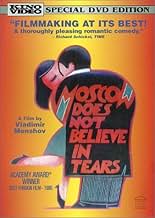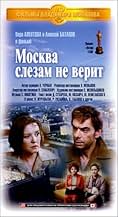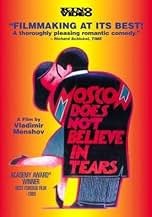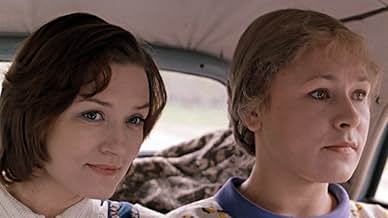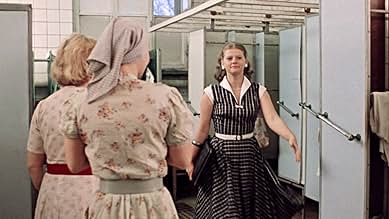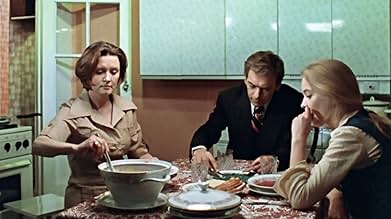IMDb-BEWERTUNG
8,0/10
15.163
IHRE BEWERTUNG
Drei junge Frauen aus der Provinz kommen nach Moskau auf der Suche nach dem, wonach die Menschen in allen Hauptstädten der Welt suchen - Liebe, Glück und Wohlstand.Drei junge Frauen aus der Provinz kommen nach Moskau auf der Suche nach dem, wonach die Menschen in allen Hauptstädten der Welt suchen - Liebe, Glück und Wohlstand.Drei junge Frauen aus der Provinz kommen nach Moskau auf der Suche nach dem, wonach die Menschen in allen Hauptstädten der Welt suchen - Liebe, Glück und Wohlstand.
- Regie
- Drehbuch
- Hauptbesetzung
- 1 Oscar gewonnen
- 3 Gewinne & 1 Nominierung insgesamt
Vladlen Paulus
- Pyotr Lednev
- (as V. Paulus)
Empfohlene Bewertungen
10akoumare
This was one of the last movies I have seen before leaving Russia. I am watching it every time with a lot of pleasure. It is funny, and touching to tears some moments. It is also very realistic, as many women in Russia went through the same problems as the three girls, and it touches most of people in Russia. It is also showing that it is never late to restart and suceed in your life, and in spite of difficulties it is possible to reach your goal and success (whatever it means for you).
Vladimir Menshov's well-balanced 'Moscow does not believe in tears' provides a moving story about human warmth. About fortunes and misfortunes that can befell anyone of us -- enabling us to identify easily.
This film also is about a very East European female eagerness to hunt after Mr. Right. Pressure is on, for in Communist society failure usually meant a lifelong condemnation to a poor, worried, boring and tiring life in some drab Russian provincial town. With a big possibility that your husband would booze himself up too much.
No doubt this film's acting makes its strongest feature. Its uninterrupted, breathtaking quality convincingly carries you back some fifty years in time. To Moscow, the capital of the USSR. Although this Communist society has been gone for a long time, 'Moscow does not believe in tears' will easily get you back there.
This film also is about a very East European female eagerness to hunt after Mr. Right. Pressure is on, for in Communist society failure usually meant a lifelong condemnation to a poor, worried, boring and tiring life in some drab Russian provincial town. With a big possibility that your husband would booze himself up too much.
No doubt this film's acting makes its strongest feature. Its uninterrupted, breathtaking quality convincingly carries you back some fifty years in time. To Moscow, the capital of the USSR. Although this Communist society has been gone for a long time, 'Moscow does not believe in tears' will easily get you back there.
Culturally interesting since this occurs in a Communist country that US propaganda gave little insight on the values and realities of the people. We see idealistic poets who say the older generation made mistakes, women promoted to executive positions, a film produced by the State yet approaching sexual themes, Western idolization, the drudgery of repetitive industrial work, and class distinctions between the haves and have-nots.
Also of interest is the protagonist's view of herself. Without revealing plot twists, it is suffice to say that a woman is socially seen as submissive to the man. This is a shock to Western sensibilities of women's equality, especially as we see her ordeals as a result of a man's selfishness and dominance. What is revealing is that she, herself does not rebel against the System. She works within the parameters, creates her own success, and becomes transformed.
Being Western, I found myself questioning whether she had truly achieved something. The crown of achievement, we are taught, is independence, equality. Whereas she achieved that in a career and in her lifestyle, in her heart, she yearned for a man, to be the little wife, and to submit herself to a patriarchal marriage. But, in the end, who are we to judge another's happiness?
Also of interest is the protagonist's view of herself. Without revealing plot twists, it is suffice to say that a woman is socially seen as submissive to the man. This is a shock to Western sensibilities of women's equality, especially as we see her ordeals as a result of a man's selfishness and dominance. What is revealing is that she, herself does not rebel against the System. She works within the parameters, creates her own success, and becomes transformed.
Being Western, I found myself questioning whether she had truly achieved something. The crown of achievement, we are taught, is independence, equality. Whereas she achieved that in a career and in her lifestyle, in her heart, she yearned for a man, to be the little wife, and to submit herself to a patriarchal marriage. But, in the end, who are we to judge another's happiness?
This film makes one wonder what exactly the heroine worked so hard for. A young girl from a small town comes to Moscow and becomes pregnant. Her lover repudiates her, the lover's mother humiliates her, telling her that she is not a good fit for her big-city dandy son. Rather than leave Moscow and go back to her parents, or try to perform an abortion on herself, the heroine has the baby. She works hard at the factory, getting up at 5 AM every morning, passes grueling entrance exams into college, becomes an engineer -- all while raising her little girl as a single parent and an unwed mother. Bold subject matter for a Soviet movie made in the seventies.
Then -- a compromise: the heroine who, sixteen years after her ordeal, has a good life, a good home, and a prestigious managerial job, falls head over heals for a man who treats her like dirt.
"Moscow Does Not Believe in Tears" was made almost at the same time as the equally celebrated "Workplace Romance" ("Sluzhebnyj Roman"), and they are, in a sense, competitors. Both movies are about single women in their mid- to late thirties who made a brilliant career but were never married. Both heroines are presented as strong-willed, independent individuals in managerial positions, whose lives are nevertheless missing something. But if "Sluzhebnyj Roman" says that life is incomplete without love, "Moscow Does Not Believe in Tears" says that life is incomplete without a man.
Women of the older generation are all in love with "Moscow"'s main male character -- the heroine's ultimate husband. I cannot fathom why -- the actor's cute, but his character is unnerving. One does not need to be a feminist to have a strong urge to throw this man down the stairs. He stifles every impulse of individuality in her; he presumes to know what she wants, what's proper for her and what's not; he patronizes her; he pushes her around. On the train, he begins their acquaintance by commenting: "You have the eyes of a woman who is not married." (What kind of eyes are those?) I cannot see why one would find any charm in such familiarity and cocky self-assurance from a stranger.
It's worth noting that the corresponding character in "Sluzhenyj Roman" -- an excessively mild-mannered, shy man -- learns to stand up to the bossy heroine, but does so without disrespecting her. The character in "Moscow", on the contrary, puts the heroine in her proper place -- which is to be quiet and follow orders.
I think that a Western critic would perceive the ending of "Moscow Does Not Believe in Tears" as ironic and sad. The heroine, a woman who spent her life making something of herself by overcoming seemingly insurmountable obstacles, is last shown fussing around her kitchen for the benefit of a man who was not with her on that long journey, who dares to raise his voice at her in her own home, while eating her food, and who acts as if his very physical presence at the table confers a rare privilege on a woman whose clock is ticking.
Then -- a compromise: the heroine who, sixteen years after her ordeal, has a good life, a good home, and a prestigious managerial job, falls head over heals for a man who treats her like dirt.
"Moscow Does Not Believe in Tears" was made almost at the same time as the equally celebrated "Workplace Romance" ("Sluzhebnyj Roman"), and they are, in a sense, competitors. Both movies are about single women in their mid- to late thirties who made a brilliant career but were never married. Both heroines are presented as strong-willed, independent individuals in managerial positions, whose lives are nevertheless missing something. But if "Sluzhebnyj Roman" says that life is incomplete without love, "Moscow Does Not Believe in Tears" says that life is incomplete without a man.
Women of the older generation are all in love with "Moscow"'s main male character -- the heroine's ultimate husband. I cannot fathom why -- the actor's cute, but his character is unnerving. One does not need to be a feminist to have a strong urge to throw this man down the stairs. He stifles every impulse of individuality in her; he presumes to know what she wants, what's proper for her and what's not; he patronizes her; he pushes her around. On the train, he begins their acquaintance by commenting: "You have the eyes of a woman who is not married." (What kind of eyes are those?) I cannot see why one would find any charm in such familiarity and cocky self-assurance from a stranger.
It's worth noting that the corresponding character in "Sluzhenyj Roman" -- an excessively mild-mannered, shy man -- learns to stand up to the bossy heroine, but does so without disrespecting her. The character in "Moscow", on the contrary, puts the heroine in her proper place -- which is to be quiet and follow orders.
I think that a Western critic would perceive the ending of "Moscow Does Not Believe in Tears" as ironic and sad. The heroine, a woman who spent her life making something of herself by overcoming seemingly insurmountable obstacles, is last shown fussing around her kitchen for the benefit of a man who was not with her on that long journey, who dares to raise his voice at her in her own home, while eating her food, and who acts as if his very physical presence at the table confers a rare privilege on a woman whose clock is ticking.
Being of Russian descent and a first generation Australian, I first saw this film in the original Russian a year or two after it came out. At the time I thought it was one of the funniest things I had seen in a long long time. I saw it again when our World Movie channel broadcast it and I laughed just as hard and just as long. To understand the comedy in what appears to be a story of feminist angst you need to be Russian. There is no other way to see it. We don't see that the supposed conflict between between the heroine and her lover is that she is a manager and he is not. It's much more primal than that. It is because she EARNS more than he does. Women held managerial positions in the USSR since they first began driving tanks and tractors during the second world war. Most of us are brought up to believe that we can do just about anything, and a lot of the time we have to. So please, if you see this film, remember to laugh. Remember that Yes, Russians aren't happy unless they're miserable but the story of this film is also about the joy of rebuilding lives and relationships for both men and women and about the triumph of the human spirit over seemingly impossible odds.
Wusstest du schon
- WissenswertesOne of four Russian films ever to win Academy Award for Best Foreign Language Film. The other are Krieg und Frieden (1965), Uzala, der Kirgise (1975) and Die Sonne, die uns täuscht (1994).
- PatzerWhen Lyudmila and her friend approach the office building she is wearing a pair of white shoes. Once inside the building the shoes color changes to black.
- Zitate
Lyudmila Gurina: Don't cry.
Lyudmila Gurina: You know what Moscow thinks of tears.
Lyudmila Gurina: We shouldn't be sitting around, we should do something.
- VerbindungenFeatured in Der Kurschatten (1985)
- SoundtracksAleksandra, Aleksandra
Written by Sergey Nikitin and Dmitry Suharev and Yuri Vizbor
Performed by Tatyana Nikitina and Sergey Nikitin
Top-Auswahl
Melde dich zum Bewerten an und greife auf die Watchlist für personalisierte Empfehlungen zu.
- How long is Moscow Does Not Believe in Tears?Powered by Alexa
Details
- Erscheinungsdatum
- Herkunftsland
- Offizieller Standort
- Sprache
- Auch bekannt als
- Moscow Does Not Believe in Tears
- Drehorte
- Produktionsfirmen
- Weitere beteiligte Unternehmen bei IMDbPro anzeigen
Box Office
- Budget
- 900.000 $ (geschätzt)
- Weltweiter Bruttoertrag
- 217 $
- Laufzeit2 Stunden 30 Minuten
- Seitenverhältnis
- 1.37 : 1
Zu dieser Seite beitragen
Bearbeitung vorschlagen oder fehlenden Inhalt hinzufügen


